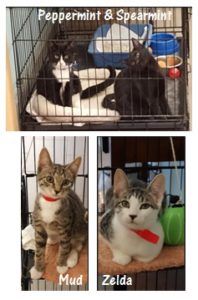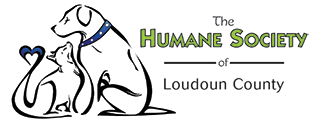
Towne Animal Clinic, located at 64 A Plaza Street NE in Leesburg, has partnered with the Humane Society of Loudoun County since 2008. The clinic’s support has made an invaluable contribution to the ability of the Humane Society, a non-profit organization run completely by volunteers, to rescue and find homes for so many dogs and cats through the years. A quick tour of the clinic’s website demonstrates that community service is at the heart of the mission for the practice, and the Humane Society of Loudoun County is grateful to benefit from their generosity and commitment to the quality of life of our animal friends.
For anyone looking for a caring, compassionate practice to treat their animal family members, the Towne Animal Clinic is accepting new patients.
The dedicated veterinarians of the Towne Animal Clinic have been providing care to the dogs, cats, guinea pigs, hamsters, gerbils, rabbits, mice, and rats of Loudoun County since 1985 (sorry, no chinchillas, reptiles, or spiders—but they will provide referrals). The practice’s Doctors—Len Rice, Jason Bollenbeck, Melissa Derbin, Tyler Barrett, and Elizabeth Byers—and their staff of twenty make it a priority to listen patiently and respectfully to client concerns about their companions and to approach health care as a team.
The clinic has partnered with the Humane Society of Loudoun County (HSLC) since 2008, providing invaluable support in a variety of ways. In addition to maintaining a donation box for our Pet Pantry Program in their lobby, they have also at times allowed us to display some of our kittens available for adoption. 
The clinic is one of eleven vets in the county that accepts HSLC’s discount certificates for the low-cost Spay/Neuter Program. A large percentage of our foster animals receive medical care from the doctors at Towne Animal Clinic, enabling us to provide essential health care to animals for whom we are seeking homes.
The clinic is also a key support in HSLC’s Trap/Neuter/Return Program with feral cats, which are the main sources of homeless kittens in the county. Spaying and neutering the cats, in addition to vaccinating and providing other care, supports the Trap/Neuter/Return Program in protecting other wildlife and decreasing disease in the colonies that pop up in various places. This work would not be possible without the support of community partners.
A VET WHO MAKES A DIFFERENCE
Dr. Melssa Derbin has been a veterinarian at Towne Animal Clinic since 2011. Originally from Indiana, she moved to Virginia to join the practice after graduating from Purdue University School of Veterinary Medicine. Why Virginia? Dr. Derbin had met her husband, Randy, also a veterinarian, in a Business Management class at Purdue, and he told her there were jobs to be had in the Northern Virginia Area. Why Towne Animal Clinic? “They do a lot of things in addition to general practice including surgeries and advanced dental care,” she explains. “Also, I love the family atmosphere, knowing my client’s names and walking through life with them. Keeping my patients happy and healthy through the life cycle is very rewarding.”
On a typical day in the practice, Dr. Derbin starts by checking in on any animals who had to stay overnight in the clinic, then she’ll see about twenty patients throughout the day. Wednesdays are for surgery, and the clinic is open half day on Saturdays. Although she sees mostly dogs and cats, one of her favorite areas of practice is treating small animals such as hamsters and mice that her clients bring in for care. “People are very attached to their small mammals,” she said, indicating with the palm of her hand the size of some of her patients.
Dr. Derbin is planning on training her dog, Pete, to become a therapy dog. The story of this 103-pound King Shephard illustrates the clinic’s dedication to helping animals in need. Found in a box with an injured paw about two years ago, weighing just three pounds, the vets and staff worked tirelessly to keep him alive, taking turns bottle feeding him and taking him home. At one point, as the puppy battled a respiratory infection, Dr. Derbin told her husband, “If I don’t take him home tonight, he won’t make it.” The rest is history—he recovered, and found a home where he is cherished and loved as he deserves. One day Pete will be serving either veterans or kids, whichever he prefers, who may be dealing with injuries like his.
How can people who care about homeless animals contribute to the cause? “Volunteering your time is the number one thing you can do to help,” Dr. Derbin believes wholeheartedly. There are many ways to help, and for people who are too pressed for time but can make donations to shelters and organizations, she emphasizes that giving locally can have a significant impact. “Donating to big national organizations doesn’t trickle down to local organizations like people sometimes think. Give to your local organizations, and you will be much more likely to see that money help the animals in your community.”
